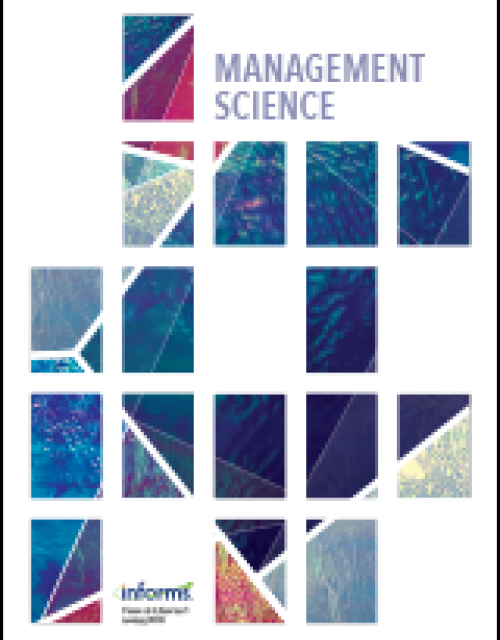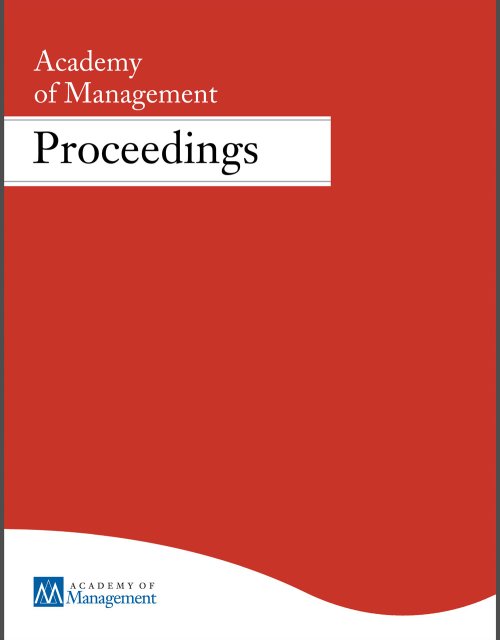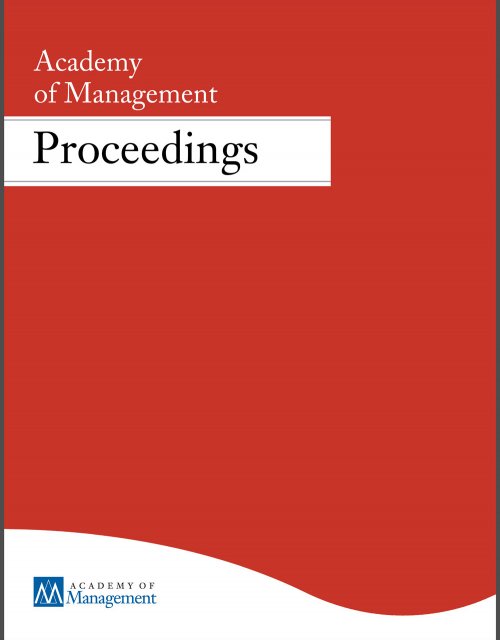Publication records
Subject(s)
Economics, politics and business environment
Keyword(s)
digital identity, e-government, digital transformation
Subject(s)
Information technology and systems; Management sciences, decision sciences and quantitative methods; Technology, R&D management
Keyword(s)
machine accuracy, decision making, human-in-the-loop, algorithm aversion, dynamic learning
Artificial intelligence systems are increasingly demonstrating their capacity to make better predictions than human experts. Yet, recent studies suggest that professionals sometimes doubt the quality of these systems and overrule machine based prescriptions. This paper explores the extent to which a decision maker (DM) supervising a machine to make high-stake decisions can properly assess whether the machine produces better recommendations. To that end, we study a set-up in which a machine performs repeated decision tasks (e.g., whether to perform a biopsy) under the DM’s supervision. Because stakes are high, the DM primarily focuses on making the best choice for the task at hand. Nonetheless, as the DM observes the correctness of the machine’s prescriptions across tasks, she updates her belief about the machine. However, the DM is subject to a so-called verification bias such that the DM verifies the machine’s correctness and updates her belief accordingly only if she ultimately decides to act on the task. In this set-up, we characterize the evolution of the DM’s belief and overruling decisions over time. We identify situations under which the DM hesitates forever whether the machine is better, i.e., she never fully ignores but regularly overrules it. Moreover, the DM sometimes wrongly believes with positive probability that the machine is better. We fully characterize the conditions under which these learning failures occur and explore how mistrusting the machine affects them. These findings provide a novel explanation for human-machine complementarity and suggest guidelines on the decision to fully adopt or reject a machine.
© 2023, INFORMS
ISSN (Online)
1526-5501
ISSN (Print)
0025–1909
Subject(s)
Strategy and general management; Technology, R&D management
Keyword(s)
alliance termination; disintegration, innovation strategy, open innovation closure, relationship dissolution, tie dissolution
ISSN (Online)
2688-2639
ISSN (Print)
2688-2612
Subject(s)
Finance, accounting and corporate governance
Keyword(s)
Tax avoidance, tax burden, tax incidence
JEL Code(s)
H20, H25
ISSN (Online)
1911-3846
ISSN (Print)
0823-9150
Subject(s)
Finance, accounting and corporate governance
Keyword(s)
Mandatory disclosure, voluntary disclosure, information spillovers, crowding-out
JEL Code(s)
M41, M48, G38
We predict and find that regulated firms’ mandatory disclosures crowd out unregulated firms’ voluntary disclosures. Consistent with information spillovers from regulated to unregulated firms, we document that unregulated firms reduce their own disclosures in the presence of regulated firms’ disclosures. We further find that unregulated firms reduce their disclosures more the greater the strength of the regulatory information spillovers. Our findings suggest that a substitutive relationship between regulated and unregulated firms’ disclosures attenuates the effect of disclosure regulation on the market-wide information environment.
Subject(s)
Economics, politics and business environment
Keyword(s)
Sophistication, naivete, first-degree, price, discrimination, third-degree price discrimination, big data, privacy
JEL Code(s)
D21, D49, D69, L19
We initiate the study of naivete-based discrimination, the practice of conditioning offers on external information about consumers’ naivete. Knowing that a consumer is naive increases a monopolistic or competitive firm's willingness to generate inefficiency to exploit the consumer's mistakes, so naivete-based discrimination is not Pareto-improving, can be Pareto-damaging, and often lowers total welfare when classical preference-based discrimination does not. Moreover, the effect on total welfare depends on a hitherto unemphasized market feature: the extent to which the exploitation of naive consumers distorts trade with different types of consumers. If the distortion is homogenous across naive and sophisticated consumers, then under an arguably weak and empirically testable condition, naivete-based discrimination lowers total welfare. In contrast, if the distortion arises only for trades with sophisticated consumers, then perfect naivete-based discrimination maximizes social welfare, although imperfect discrimination often lowers welfare. And if the distortion arises only for trades with naive consumers, then naivete-based discrimination has no effect on welfare. We identify applications for each of these cases. In our primary example, a credit market with present-biased borrowers, firms lend more than socially optimal to increase the amount of interest naive borrowers unexpectedly pay, creating a homogenous distortion. The condition for naivete-based discrimination to lower welfare is then weaker than prudence.
This is an open access article.
Volume
132
Journal Pages
1019–1054
Subject(s)
Economics, politics and business environment
JEL Code(s)
D14, D18, D21
We analyze conditions facilitating profitable deception in a simple model of a competitive retail market. Firms selling homogenous products set anticipated prices that consumers understand and additional prices that naive consumers ignore unless revealed to them by a firm, where we assume that there is a binding floor on the anticipated prices. Our main results establish that “bad" products (those with lower social surplus than an alternative) tend to be more reliably profitable than “good" products. Specifically, (1) in a market with a single socially valuable product and sufficiently many firms, a deceptive equilibrium - in which firms hide additional prices - does not exist and firms make zero profits. But perversely, (2) if the product is socially wasteful, then a profitable deceptive equilibrium always exists. Furthermore, (3) in a market with multiple products, since a superior product both diverts sophisticated consumers and renders an inferior product socially wasteful in comparison, it guarantees that firms can profitably sell the inferior product by deceiving consumers. We apply our framework to the mutual-fund and credit-card markets, arguing that it explains a number of empirical findings regarding these industries.
This is an open access article.
Volume
84
Journal Pages
323–356
Subject(s)
Entrepreneurship
Alexander and Lorenzo were at a crossroads with their biotech startup, PhagoMed. They had left high-profile positions at Boston Consulting Group (BCG) three years earlier, driven by a bold vision to tackle the global crisis of antibiotic resistance using phages, viruses with the remarkable ability to target specific bacteria. Despite a robust commitment to R&D yielding deeper insights into phage biology, the journey from lab to clinic was frustratingly slow. And with their capital dwindling, they faced the urgent need to reassess their strategic direction and resource allocation.
| buy now |
Subject(s)
Human resources management/organizational behavior
While decades of research have demonstrated that networks, through their structural configurations, powerfully influence people’s behaviors, attitudes, and outcomes, recent work has sought to better understand the role of individuals in shaping network processes. There are increasing appeals to devote greater attention to the differences individuals exhibit in establishing, managing, and navigating social relations. Accumulated evidence underlines that 1) individuals may be able to actively position themselves in the network and that 2) agency and purposive action may look different for certain individuals despite occupying similar network positions. In response to these emerging discussions, our symposium aims to contribute to a better understanding of individual agency in network theory. Questions include: What role do individuals play in shaping the process of network evolution? And, how do these dynamics impact the distribution of social capital (positive or negative) among actors within networks? This line of work provides a promising starting point for network agency research. Our presenters’ research highlights that a productive conceptualization of individual agency within organizational networks should be multifaceted. People might strategically leverage social relations and network relations for their own sake without meaningfully changing the structure of their networks. They can also take actions that meaningfully shape the architecture of their networks, intentionally or otherwise. During the processes of individuals exerting agency in shaping their social relations and exploiting network-related advantages, numerous potential mechanisms exist and should be systematically elaborated.
With permission of the Academy of Management
Volume
2024
ISSN (Online)
2151-6561
ISSN (Print)
0065-0668
Subject(s)
Technology, R&D management
Keyword(s)
augmentation, automation, task routinization, human capital, crowd science, algorithmic management
Artificial intelligence (AI) is diffusing rapidly throughout the economy, raising questions regarding its impact on human workers. Current theories predict that the degree to which humans are replaced (automation) or supported (augmentation) will depend on characteristics of the task such as its degree of routinization and manual vs. cognitive nature. Yet, existing empirical evidence tends to come from aggregate occupation data or individual case studies, with limited research using larger samples of projects or tasks. Moreover, whether and how AI is implemented may not only depend on task characteristics but also on managers’ objectives, which may go beyond narrow efficiency to include benefits resulting from human employment itself (“employment goals”). We provide novel empirical evidence using data from more than 1,200 research projects that involve crowd members in different tasks such as data collection, data analysis, or creative problem solving. We confirm that the use of AI is associated with task characteristics, although the patterns are more nuanced than those shown in work on prior automation technologies such as computers and robots. Moreover, we find that managers pursuing employment goals are less likely to use AI for automation, while they are just as likely as others to use AI to augment the work of human workers. We contribute to the literature on AI adoption in organizations by providing rare evidence from project-level data, and by highlighting that the path towards “good AI” or “bad AI” is, partly, a matter of human choice.
With permission of the Academy of Management
Volume
2024
ISSN (Online)
2151-6561
ISSN (Print)
0065-0668


